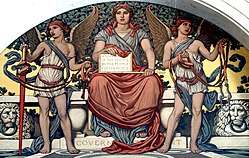Monetary authority
In finance and economics, a monetary authority is the entity that manages a country’s currency and money supply, often with the objective of controlling inflation, interest rates, real GDP or unemployment rate. With its monetary tools, a monetary authority is able to effectively influence the development of short-term interest rates, but can also influence other parameters which control the cost and availability of money.[1]
| Public finance |
|---|
 |
|
|
Reform |
|
Generally, a monetary authority is a central bank or currency board. Most central banks have a certain degree of independence from the government and its political targets and decisions. But depending on the political set-up, governments can have as much as a de facto control over monetary policy if they are allowed to influence or control their central bank. A currency board may restrict the supply of currency to the amount of another currency. In some cases there may be free banking where a broad range of entities (such as banks) can issue notes or coin.
Commonly, there is one monetary authority for one country with its currency. However, there are also other arrangements in place, such as in the case of the eurozone where the so-called Eurosystem, consisting of the European Central Bank and the 19 European Union member states that have adopted the euro as their sole official currency, is the sole monetary authority. Some countries do not have a central bank or other monetary authority, such as Panama.
Americas
- Bank of Canada
- Bermuda Monetary Authority
- Cayman Islands Monetary Authority
- Central Bank of Barbados
- Eastern Caribbean Central Bank
- Federal Reserve System (United States)
Asia
Oceania
See also
References
- Jahan, Sarwat. "Inflation Targeting: Holding the Line". International Monetary Funds, Finance & Development. Retrieved 28 December 2014.